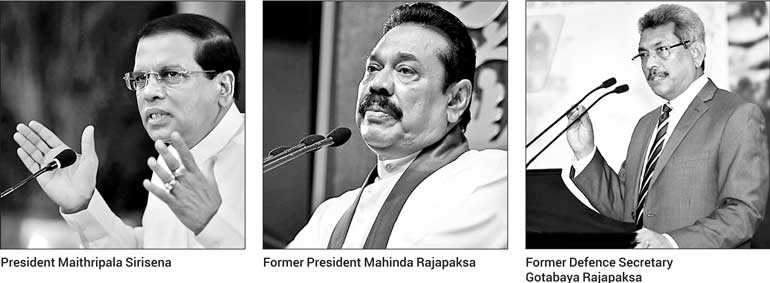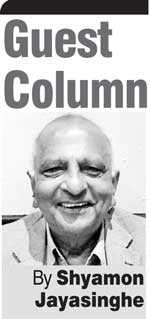Monday Feb 23, 2026
Monday Feb 23, 2026
Saturday, 4 May 2019 00:10 - - {{hitsCtrl.values.hits}}

 “…it is not the doctrine of the founder per se but the socio-politico milieu which a religious
“…it is not the doctrine of the founder per se but the socio-politico milieu which a religious
doctrine inhabits that can give it the horrible
potential for intolerance and violence…”
Power game resumes
The horrifying sadness engulfing our nation notwithstanding, we observe, once again, the ruthless play of the power game by our senior politicians. In a country like where I live (Australia) competing political parties would have come together, eschewed the blame game and united themselves to collectively find an agreed strategy in order to prevent this from ever happening again. Not so in Sri Lanka.
To begin with, the power game offered fertile ground for the emergence of Muslim radicalism in Sri Lanka and it resumes even today unashamedly in the face of the Easter Sunday human onslaught that killed nearly 300 persons while in prayer and Western tourists while having breakfast, leaving many more in hospital battling for their lives.
Rajapaksa brothers acting
Mahinda Rajapaksa rushed to the scene, visiting dead bodies along with TV cameras. Acting outraged, he exclaimed that this would not have happened had they been in power. His once powerful brother, former Defence Secretary Gotabaya Rajapaksa, who has been for months grooming himself to be presidential candidate in the forthcoming elections, made a pre-election promise that if he comes to power he would ensure that Islamic radicalism will be banished forever.
Foolish and gullible persons (both ‘educated,’ and illiterate) who have bought the Rajapaksa-created myth that the brothers had won the war with the Army General playing only a disposable and supporting role, nods a chorus, “Yes. Indeed, true”!
In Nadagam style, Sinhalese call this an “athwel gaayana.” How familiar I am since playing decades ago in the Maname original cast! The Rajapaksa chorus is observed in the diaspora, too, where otherwise respectable professionals are observed performing that.
Global radical Islam
A global force of an onward-march of radical Islam lies at the depths of the tragedy we saw on Easter Sunday. One cannot properly comprehend the Easter human disaster without knowing what this aggressive march of monstrosity is. It isn’t, plainly, Islam. That’s is for sure. Islam is a doctrine of peace. However, doctrines of all religions are one thing and the religious manifestations are another – variedly another.
The problem of religion is that it is built on unquestionable faith; there is no search for evidence or resort to reasoned argument possible in any discourse pertaining to any religion. Faith offers a dangerous leap because it is a slippery ground for many a crazy adventure in the name of religion. Christianity has had a violent history of intolerance. Even Buddhism – reputed as the world’s most peaceful religion – is now showing bigotry and savagery.
Atheists like me advocate the end of all religion and we love John Lennon’s memorable and awe-inspiring song, ‘Imagine,’ which invokes us to imagine (among other things) there is no religion and “all the people living in peace.”
Socio-political milieu
This points out to one solid reality, namely, it is the doctrine of the founder per se but the socio-politico milieu which a religious doctrine inhabits that can give it the horrible potential for intolerance and violence.
In the global context it is geopolitics. Western imperialism needed the input of the Christian religion to give it justification and driving power. That imperialism is now over. Radical Islam is also driven by geopolitics. The Arab states have a vital economic hold on the rest of the world in the supply of oil. Yet, looking around, they feel they are under threat from the Western political forces and the Western modernising cultural forces that threaten their whole way of life.
They recall the glorious days when Prophet Muhammed went conquering lands of heathen or unbelievers and expanded into a kind empire. Although in a different world context altogether, modern Muslim geopolitics is driven on this same ideology of expansion and conquest; the missionary objective of religious conversion is only the justifying and energising emotional drive.
Any religion can always find some apparent justification from a perception on the part of believers of the founder’s intention.
Osama Bin Laden was the prophet of radical Islam. Today’s radicalists take their cue from him. Born in a wealthy Yemeni family Osama was extremely wealthy himself-owning billions worth at the time of his death. Osama bin Laden mocked the Americans and the West in general as sworn enemies of Islam and the Islamic way of life. Since Christianity provides the foundation of the Western civilisation, so Christians everywhere are potential victims of their wrath. Bin Laden’s own destruction by US power is a constant stimulus for anger and hate among fundamentalists.
Emergence of radical Islam in Sri Lanka
The above brief gives some indication of the considerably potential danger of radical Islamists. Hence, Sri Lanka cannot afford but to wipe out this menace and have a constant eye on local developments. This is not something our political leaders ever sensed. Their power game was more important. Muslims, to them, formed a significant vote bank. Why not pacify that?
Sharmila Syyad writing recently to the Colombo Telegraph (‘Easter Sunday Monstrosity’) points out how these radicalists had surfaced in the island as far back as 2002. She observed in her village how these bands of youth went about brainwashing other youth and compelling girls and women to wear the abaya and long gown.
Muslim merchants made good money from that, she suggests. “The abayas and other masks took root as default symbols of our ‘culture,’” says the writer.
Even the Quran which had previously cost only Rs. 300 was soon sold for Rs. 3,000 plus, the writer says. Gradually this trend kept growing. Soon, schools came up out of oil funds from Gulf States and kids became indoctrinated in a violence-prone version of the faith.
Both major parties wouldn’t touch these elements because they would lose votes. The majority Sinhala vote bank being highly competitive, the votes of Muslims and Tamils became vital for victory. In this way, the movement that caused our Easter genocide grew and grew.
Some moderate Muslim leaders who met President Sirisena at a meeting of all religious leaders held recently in his office pointed out how they had repeatedly informed the former Rajapaksa Government about the threat of radical Islam and how nothing had been done.
Azad Ali, Governor of the Western Province, in a recent TV interview charged that Gotabaya Rajapaksa was protecting and strengthening the radicalist leader of Thoweed Jamaat, the terrorist organisation which coordinated the Easter bombings.
Now, a different song
We know that President Maithripala Sirisena kept the Prime Minister out of Security Council meetings since the failed constitutional coup on 26 October; nor was the State Minister of Defence in the council. This was a different manifestation of the political power game screaming, as it was, with stupidity and catastrophe only.
One online paper said, “He took away all power of security along with him like a Grama Sevaka taking all files along with him.” Our President made a beeline to God Tirupathi. Comrade Tirupathi should have warned him, “Get back! A calamity is about to fall on your people”!
The comic element is hard to un-see. Sirisena needs to vacate, asap. On the other hand, the attempted re-entry of the Rajapaksa brothers into the political arena on the graves of corpses represents a sordid kind of duality characterised by both catastrophe and hilarity.
The newspapers reported on 30 April that Mahinda is locked up in meetings with Gota and former defence personal, in a kind of Security Council of his own making. The 52-day fake Prime Minister seems in the process of becoming a fake President.
(The writer can be reached via [email protected].)